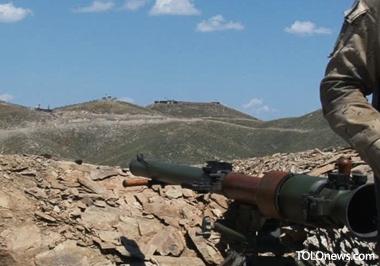After a second clash in a week on the Durand Line, the Afghan government has deployed additional forces in Goshta district of the eastern Nangarhar province, putting hundreds of border police backed by army and quick reaction force on standby to prevent the Pakistani military from rebuilding a gate ‘on the Afghan soil’.
The Afghan forces have engaged in fierce battles with the Pakistani forces twice in the past ten days, killing at least one Afghan border police and wounding three others. There are unconfirmed reports about Pakistani casualties too.
“We sent a letter to the Pakistanis asking them to stop building the gate, but they responded with missiles,” said the commander of an Afghan Border Police (ABP) unit in Goshta, Lieutenant Colonel Abdul Basir Kamawal, pointing at three Afghan border outposts as the sign of an intense battle. The towers have been severely damaged.
“More than a thousand rockets and other artilleries were fired on us. It was a serious battle. They have now brought tanks to threaten us.”
The Pakistani government said that their forces came under unprovoked fire from the Afghan side. The Afghans have disputed the account.
Pakistan recently started building a gate near a 10-year old border base. President Karzai said the gate and the base was on the Afghan soil. It has been questioned why a Pakistani military base built in Goshta was not as provocative as the gate for Afghanistan.
The Afghan government now says that both the gate and the base are on the Afghan territory, however, the target for the Afghan forces in the last two battles was to only destroy the gate, just more than 500 meters away from the Afghan post.
In the outpost where the battle took place, ABP has three towers, while the Pakistanis have a base with a dozen visible watch towers around the area.
Nearly 250 border police are stationed in Goshta. The Afghan National Army (ANA) are seen in considerable numbers down the hill, where they act as a standby force equipped with short-range missiles, ammunition and medical support.
The Afghan Ministry of Interior believes they have sufficient forces along the Durand Line. The ANA has three of its five corps headquartered in the eastern and southern provinces bordering Pakistan, with nearly 80,000 personnel, according to an Nato map, indicating placements of Afghan and foreign troops across Afghanistan.
However, it’s said that more 150,000 Pakistani troops are stationed on the Afghan border.
“I hit the gate and destroyed its ceiling,” said Mohammad Zaman, 23, an Afghan border policeman. I asked him what he needs from his Commander-in-Chief, his response was short: Tank.
A senior border police officer in Goshta, who wished not to be named, said deploying more forces on the frontline means accepting more casualties. He urged his civilian leaders to resolve the issue through diplomatic channels.
A serious war with Pakistan, he said, was not even the last resort.
But in the provincial capital, Jalalabad, Governor Gul Agha Shirzay, says that their position is firm: They would not allow the Pakistanis to rebuild that gate.
“If they [Pakistan] rebuild it [the gate] today, I will destroy it today, if they rebuild it tomorrow, I will destroy it tomorrow. Our position is unchanged,” said Shirzay.
In the past two weeks, President Karzai twice has said that his government does not recognise the Durand Line as the border between the two countries, calling it a separation line imposed on Afghans by the British empire in 1893.
The border clash in Goshta has turned into a serious political debate within the country, provoking a nation-wide support for the Afghan forces standing against Pakistan.
Members of a Kabul-based youth group called Afghanistan Analysis and Awareness (A3) drove to the last outpost in Goshta as an effort to boost up the morale of the border police, presenting them with a national flag as a gift.
Pakistani forces in their base were watching the crowd and the Afghan celebration.
One Afghan border policeman said he would keep the flag and put it where it deserves to be: dozens of kilometers inside the current Pakistan’s territory, where the Afghans believe is the actual border between the two countries.
“We have come here to appreciate your sacrifice for the nation,” said Sami Sadat, 28, a member of A3, who organised the trip, told the policemen.
Mr Sadat, who is a UK Defence Academy graduate, said the Afghan forces need “ground and aerial fire power” if both sides engage in an escalated battle.
“You need three things to fuel such a war: physical component which includes human resource, equipment and fire power; conceptual component which is the knowledge of the war; and the morale,” said Mr Sadat.
He suggested that the army may need to be stationed at the frontline and the border police move to support role if the border becomes a war zone.
To Watch the Report click here:



Comment this post